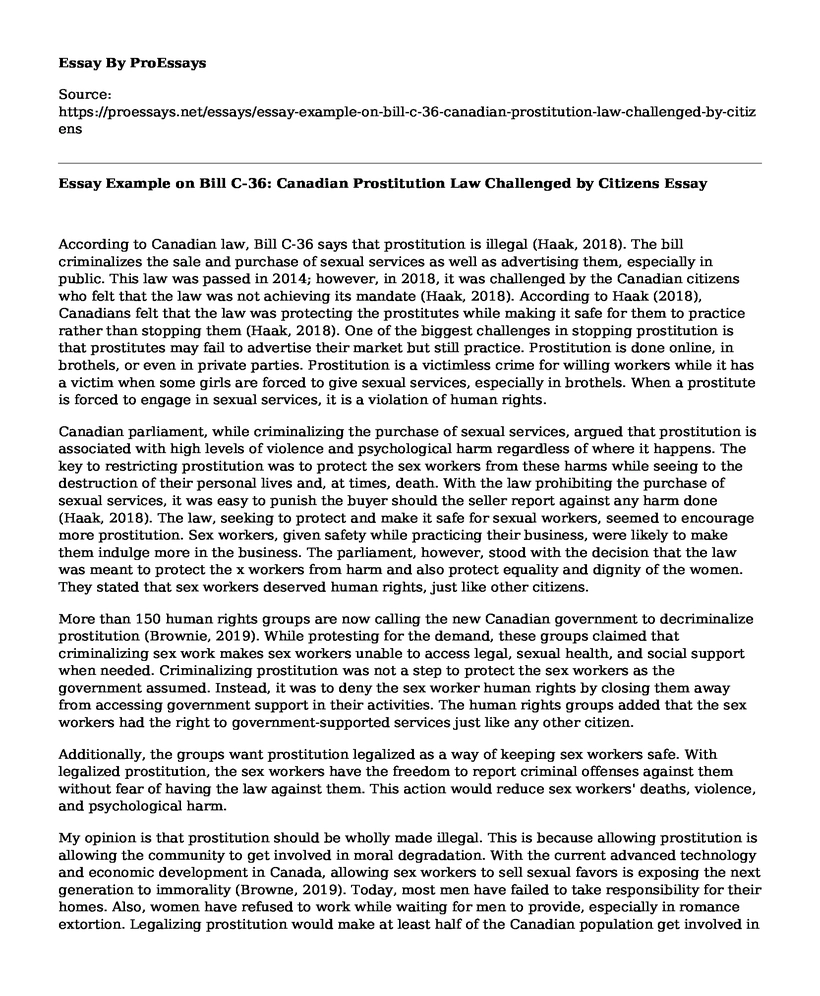According to Canadian law, Bill C-36 says that prostitution is illegal (Haak, 2018). The bill criminalizes the sale and purchase of sexual services as well as advertising them, especially in public. This law was passed in 2014; however, in 2018, it was challenged by the Canadian citizens who felt that the law was not achieving its mandate (Haak, 2018). According to Haak (2018), Canadians felt that the law was protecting the prostitutes while making it safe for them to practice rather than stopping them (Haak, 2018). One of the biggest challenges in stopping prostitution is that prostitutes may fail to advertise their market but still practice. Prostitution is done online, in brothels, or even in private parties. Prostitution is a victimless crime for willing workers while it has a victim when some girls are forced to give sexual services, especially in brothels. When a prostitute is forced to engage in sexual services, it is a violation of human rights.
Canadian parliament, while criminalizing the purchase of sexual services, argued that prostitution is associated with high levels of violence and psychological harm regardless of where it happens. The key to restricting prostitution was to protect the sex workers from these harms while seeing to the destruction of their personal lives and, at times, death. With the law prohibiting the purchase of sexual services, it was easy to punish the buyer should the seller report against any harm done (Haak, 2018). The law, seeking to protect and make it safe for sexual workers, seemed to encourage more prostitution. Sex workers, given safety while practicing their business, were likely to make them indulge more in the business. The parliament, however, stood with the decision that the law was meant to protect the x workers from harm and also protect equality and dignity of the women. They stated that sex workers deserved human rights, just like other citizens.
More than 150 human rights groups are now calling the new Canadian government to decriminalize prostitution (Brownie, 2019). While protesting for the demand, these groups claimed that criminalizing sex work makes sex workers unable to access legal, sexual health, and social support when needed. Criminalizing prostitution was not a step to protect the sex workers as the government assumed. Instead, it was to deny the sex worker human rights by closing them away from accessing government support in their activities. The human rights groups added that the sex workers had the right to government-supported services just like any other citizen.
Additionally, the groups want prostitution legalized as a way of keeping sex workers safe. With legalized prostitution, the sex workers have the freedom to report criminal offenses against them without fear of having the law against them. This action would reduce sex workers' deaths, violence, and psychological harm.
My opinion is that prostitution should be wholly made illegal. This is because allowing prostitution is allowing the community to get involved in moral degradation. With the current advanced technology and economic development in Canada, allowing sex workers to sell sexual favors is exposing the next generation to immorality (Browne, 2019). Today, most men have failed to take responsibility for their homes. Also, women have refused to work while waiting for men to provide, especially in romance extortion. Legalizing prostitution would make at least half of the Canadian population get involved in the activity, thus losing our moral values. Our children would also embrace our actions in engaging in prostitution. Besides, there would be an immense transmission of HIV/AIDS and other sexually transmitted diseases. Children would have to drop out of school due to early pregnancy and infections.
References
Browne, R. (2019, October 3). Demands grow for Canada to decriminalize sex work after the election. Global News. https://globalnews.ca/news/5970549/canada-sex-work-decriminalization/
Debra M Haak. (2018, December 9). Canada's laws designed to deter prostitution, not keep sex workers safe. The Conversation. https://theconversation.com/canadas-laws-designed-to-deter-prostitution-not-keep-sex-workers-safe-107314
Cite this page
Essay Example on Bill C-36: Canadian Prostitution Law Challenged by Citizens. (2023, Apr 24). Retrieved from https://proessays.net/essays/essay-example-on-bill-c-36-canadian-prostitution-law-challenged-by-citizens
If you are the original author of this essay and no longer wish to have it published on the ProEssays website, please click below to request its removal:
- Example of Articles Review on Syria and Iraq Conflict
- Terrorism Descriptive Narrative
- Reflection Essay Sample on the Treatment of Women in Islam
- Essay on the Complex and Expensive Presidential Nomination Process in the US
- Intelligence-Led Policing: Leveraging Tech for Risk Assessment & Crime Prevention - Essay Sample
- Essay Example on Battered Woman Defense and Social Issues
- Free Paper Sample on End Racial Discrimination: Upholding Equality in the US







